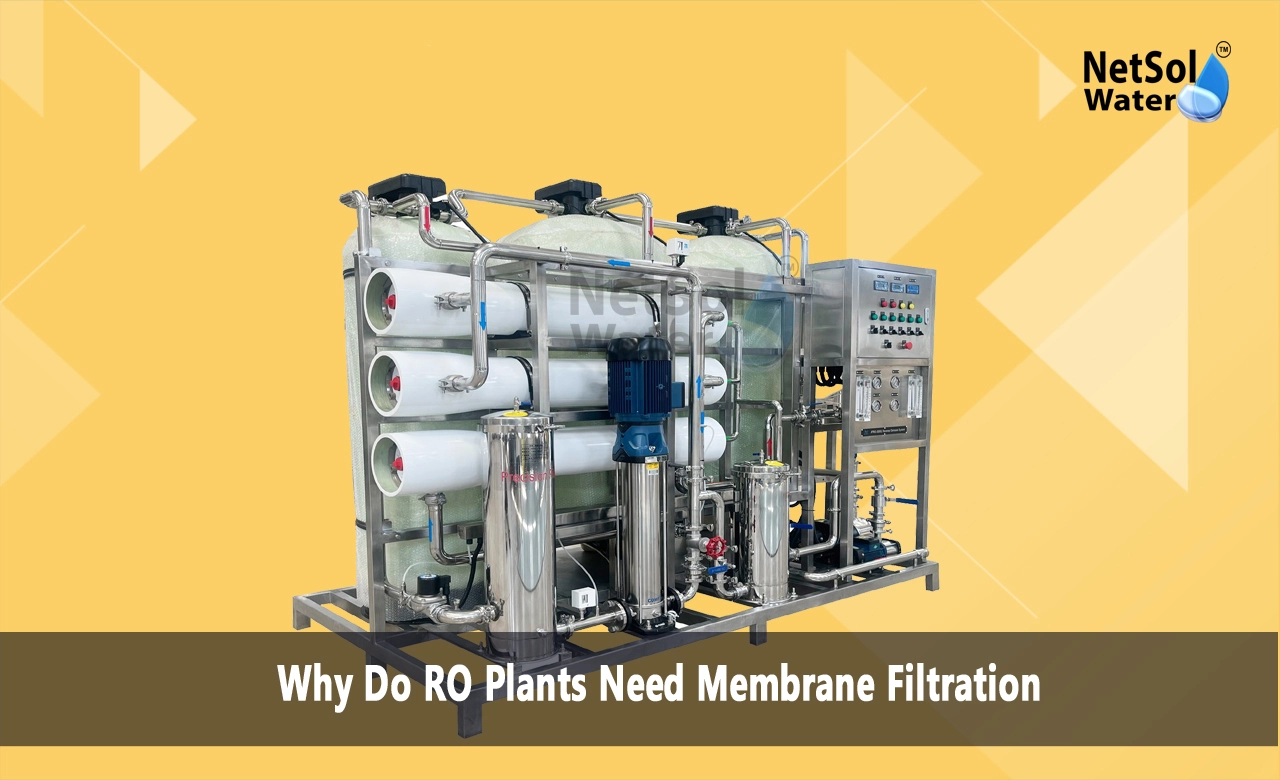Why Do RO Plants Need Membrane Filtration?
Reverse osmosis (RO) technology has emerged as a critical component in water treatment plants, providing a reliable and efficient means of purifying water for various applications, including drinking water, industrial processes, and wastewater recycling. However, the effectiveness and longevity of an RO plant heavily rely on the incorporation of membrane filtration systems.
We will explore the reasons why membrane filtration is an essential component of RO plants.
Understanding Reverse Osmosis
Reverse osmosis is a membrane-based separation process that removes dissolved solids, ions, and other contaminants from water by applying pressure to force the water molecules through a semi-permeable membrane. The membrane acts as a barrier, allowing only water molecules to pass through while rejecting larger molecules, ions, and particulates.
The Importance of Membrane Filtration in RO Plants
While RO membranes are highly effective at removing dissolved solids and contaminants, they are susceptible to fouling and scaling, which can significantly reduce their performance and lifespan. Membrane filtration systems play a crucial role in protecting the RO membranes by removing suspended solids, colloidal particles, and other contaminants that can cause fouling and scaling.
1. Pretreatment for RO Membranes
Membrane filtration is an essential pretreatment step in RO plants, ensuring that the feed water is properly conditioned before entering the RO system. By removing particulates, colloidal matter, and other contaminants, membrane filtration reduces the risk of fouling and scaling on the RO membranes, which can lead to decreased water flux, increased operating pressure, and, ultimately, membrane replacement.
2. Extending Membrane Life
RO membranes are sensitive and can be damaged by the presence of suspended solids, bacteria, and other contaminants in the feed water. Membrane filtration acts as a barrier, preventing these harmful substances from reaching the RO membranes, thereby extending their operational life and reducing replacement costs.
3. Improving Water Quality
In addition to protecting the RO membranes, membrane filtration also plays a crucial role in improving the overall quality of the treated water. By removing particulates, microorganisms, and other contaminants, membrane filtration ensures that the water produced by the RO plant meets the required quality standards for its intended use, whether it's drinking water, industrial processes, or wastewater recycling.
Types of Membrane Filtration Used in RO Plants
Several types of membrane filtration systems are employed in RO plants, depending on the quality of the feed water and the specific requirements of the application. Common membrane filtration technologies used in RO plants include:
1. Microfiltration (MF)
Microfiltration membranes are effective at removing suspended solids, bacteria, and other particles larger than 0.1 microns. They are often used as a pretreatment step for RO plants, particularly when dealing with surface water or wastewater sources.
2. Ultrafiltration (UF)
Ultrafiltration membranes have even smaller pore sizes, typically in the range of 0.01 to 0.1 microns, allowing them to remove dissolved organic compounds, colloidal particles, and macromolecules in addition to suspended solids and bacteria.
3. Nanofiltration (NF)
Nanofiltration membranes have pore sizes smaller than those of ultrafiltration membranes, ranging from 0.001 to 0.01 microns. They are effective at removing divalent ions, such as calcium and magnesium, as well as organic molecules, making them suitable for softening water and removing certain contaminants before the RO stage.
Conclusion
Membrane filtration is an indispensable component of RO plants, playing a crucial role in protecting the RO membranes, extending their operational life, and improving the overall quality of the treated water. By removing suspended solids, colloidal particles, and other contaminants, membrane filtration systems ensure the efficient and reliable operation of RO plants, enabling them to produce high-quality purified water for various applications. As water scarcity and environmental concerns continue to drive the demand for water treatment solutions, the integration of membrane filtration technologies in RO plants will become increasingly important in ensuring sustainable and cost-effective water purification processes.
Netsol Water is Greater Noida-based leading water & wastewater treatment plant manufacturer. We are industry's most demanding company based on client review and work quality. We are known as best commercial RO plant manufacturers, industrial RO plant manufacturer, sewage treatment plant manufacturer, Water Softener Plant Manufacturers and effluent treatment plant manufacturers. Apart from this 24x7 customer support is our USP. Call on +91-9650608473, or write us at enquiry@netsolwater.com for any support, inquiry or product-purchase related query.



